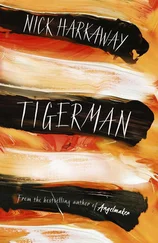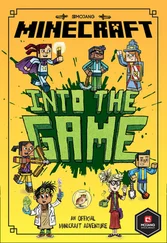Nick Harkaway - The Gone-Away World
Здесь есть возможность читать онлайн «Nick Harkaway - The Gone-Away World» весь текст электронной книги совершенно бесплатно (целиком полную версию без сокращений). В некоторых случаях можно слушать аудио, скачать через торрент в формате fb2 и присутствует краткое содержание. Жанр: Фантастика и фэнтези, Фэнтези, на английском языке. Описание произведения, (предисловие) а так же отзывы посетителей доступны на портале библиотеки ЛибКат.
- Название:The Gone-Away World
- Автор:
- Жанр:
- Год:неизвестен
- ISBN:нет данных
- Рейтинг книги:4 / 5. Голосов: 1
-
Избранное:Добавить в избранное
- Отзывы:
-
Ваша оценка:
- 80
- 1
- 2
- 3
- 4
- 5
The Gone-Away World: краткое содержание, описание и аннотация
Предлагаем к чтению аннотацию, описание, краткое содержание или предисловие (зависит от того, что написал сам автор книги «The Gone-Away World»). Если вы не нашли необходимую информацию о книге — напишите в комментариях, мы постараемся отыскать её.
The Gone-Away World — читать онлайн бесплатно полную книгу (весь текст) целиком
Ниже представлен текст книги, разбитый по страницам. Система сохранения места последней прочитанной страницы, позволяет с удобством читать онлайн бесплатно книгу «The Gone-Away World», без необходимости каждый раз заново искать на чём Вы остановились. Поставьте закладку, и сможете в любой момент перейти на страницу, на которой закончили чтение.
Интервал:
Закладка:
Mr. Crabtree shuffles along the corridor and through into a conference room. Bottles of water sit on the table, notepads and glasses at each place. Pencils have been sharpened, ready.
“Core Committee,” Crabtree says. The lack of unnecessary furniture meets with his approval, or at least it means that there are no objects to get in his way and arouse his ire. He shuffles forward.
The chair at the head of the table is bigger than all the others, and there are two trays in front of it. The green approved tray is empty. The yellow tray is full. They must be meeting tomorrow.
Robert Crabtree tuts. He walks to the head of the table and puts the new tray down, shifting the other one inward. Then he bends slowly, reproachfully, to the lower shelf on the paper cart, and fetches up a bundle of green envelopes. He takes the older set of yellow envelopes and opens them, transfers their contents to the green envelopes from his cart. Then he puts the green envelopes in the approved tray and puts them back on the cart. The proposals and recommendations from the Senior Board (in the yellow envelopes) have become actions and policies, as if by magic.
“What are you looking at?” says Mr. Crabtree. I become aware that I am staring.
“Is that . . .,” I begin. Robert Crabtree stiffens. He knows what is in my mind. This is a short circuit; it must be a mistake. But it is Robert Crabtree’s job—his vocation. It is everything he is. His life.
“Standing order,” he says. He scowls. I have suggested he doesn’t know his job. Worse, I have implied he might interfere with the paper in an inappropriate way. He might tamper. I have genuinely, deeply offended him. I took his manner to be low-level irritation, and perhaps it is. It might just be chronic pain from his withered hands. Now, though, he moves sharply, jaggedly, and his jaw is set. He has a slight underbite which makes him look like a boxer. Beneath his folded eyelids his pupils are very small. I have called his identity into question, slandered his good name.
Robert Crabtree slams the last recommendation into an execute envelope and tosses it onto the cart. Our friendship is over. He barges past me. I follow him back to the sorting room, and he turns on the threshold and glowers at me. I open my mouth to apologise, although there’s really nothing I can say: it is as if I had casually accused a priest of spitting in the communion wine. He shuts the door in my face.
Well. I am in the belly of the beast. Not the moment to regret.
I move on, into the next corridor. I am thinking about Humbert Pestle, about how a man like that could run a company which was effectively running itself. He could do anything he wanted. Use it for anything he wanted. So what does he want? Destiny, of course, but that covers a lot of ground. Greatness. Likewise.
A murmur—conversation? Prayer? Humans. I slow, move closer. There is a door ahead, light visible around the edges. I press my face to the hinge. The door is a good fit, but not perfect. I look through into the room beyond.
Ninjas, like lethal kindergartners, kneeling on the floor.
They sit in rows, maybe a hundred of them. They are quiet. At the front a whipcord-thin man is murmuring a formula, and the congregation is repeating it. Ninja om, maybe, or their version of the paternoster— Our Father, who kills in silence. On the wall there are pictures. Photos and paintings. Ninja heroes. The newest one is familiar, a huge-shouldered man brandishing a club-like fist. His stomach is covered in fat, but beneath the rolls vast abdominal muscles flex. Humbert Pestle.
The guy at the front shouts, and two ninjas from the front row leap up and attack him. He punches one, very fast, and intercepts the other’s attack and breaks his arm. It makes a noise like gristle. The injured men bow and sit down again. I feel ill. I consider setting the building on fire—a bright, scouring blaze to clean this place to the stones and put its occupants out of my misery, and then I remember Master Wu and I feel guilty for considering it. It’s not me. Not that I can’t think those thoughts (demonstrably) but the other way around: choosing not to accept that kind of idea as an actual option is what defines me as distinct from them.
Pestle is Smith is Sifu Humbert. Ninjas are crazy. I knew these things already. I leave the ninjas alone—perhaps they will hospitalise one another. I debate internally whether hoping that each of them suffers a catastrophic groin strain or bruised testicle during the course of normal business is a them sort of thought, and decide that it’s not. I spend a moment dreaming of ninja hernias.
The corridor splits, at right angles. (Is Elisabeth still above me? Or above and to the side? The gantries are unpredictable. Perhaps she is a room away, or squinting down from the junction, willing me to move one way or the other.) To the left, I would be heading back along the wall of the ninja temple; to the right, to the main body of the building and the Jorgmund offices. No doubt there are secrets there too, but they are not my secrets. They are secrets like the Colonel’s Secret Blend of herbs and spices and the one true recipe for Coca-Cola (now that there’s no actual cocaine in it); how to make a lightbulb which lasts for a hundred years or a white cloth which never stains or frays. Secrets, but not dark ones.
I go left. The left-hand path is also the sinister path. The cannibal’s road. In my heels I can feel the occasional boompf from the temple beside and, a few steps later, behind me. In my toes I can feel nothing. This end of the building is quiet.
Quiet, but not calm, and not restful. There’s nothing different about the way it looks, but it feels different. Sixty steps back that way, this building is the kind of place a guy like Buddy Keene has his office in ten years’ time—vapid, flashy, with a desk made for after-hours sex, and a lamp which gives a decent source of illumination as he leans over the intern to look down her dress. Up here it’s cold. There’s no lust in these walls. Maybe it’s the orientation of the building. During the day one side of a skyscraper soaks up more heat energy than the other. If you’re in the northern hemisphere that’s the south side, which is why an apartment with a south prospect is more expensive. This is the night side, then, grey and cold. Except that I know that isn’t it. This corridor is . . . watchful. I tell myself that yes, of course, Elisabeth is watching. But this is not her attention I feel. It is not kindly.
The hairs on the back of my neck are prickling. I keep checking my dead zone, the space directly behind you where an attacker is in a prime position to strike and there’s almost nothing you can do about it. I wave my hand through it, step slightly off-axis. Shadows twist at the far end of the corridor, little beads of darkness crawl over one another. Stare into the dark for long enough, and you see shapes. Good old human eye—if we were squid, it probably wouldn’t happen. (Squid have better eyes than we do; there’s no blind spot. I wonder briefly whether this means they have no need for image retention and therefore would be immune to television. Thousands of squid families, sitting at home at night watching a single bright spark zing across a black screen, wondering what all the fuss is about.)
The ceiling creaks above me. Elisabeth? Or someone else. Although, if Elisabeth has been caught, it was done in absolute silence. Ninja style. Really good ninja style. Do they have someone like that? Someone who is to stealth what Humbert Pestle is to combat? A ghost. Maybe the ghost is standing behind me. Maybe that’s why I feel so naked. He’s behind me right now.
I turn fast, scythe my fingers through the air, flow sideways, kick, step away to the wall. Nothing happens except that I feel like an idiot. The shadows at the end of the corridor continue to boil.
Читать дальшеИнтервал:
Закладка:
Похожие книги на «The Gone-Away World»
Представляем Вашему вниманию похожие книги на «The Gone-Away World» списком для выбора. Мы отобрали схожую по названию и смыслу литературу в надежде предоставить читателям больше вариантов отыскать новые, интересные, ещё непрочитанные произведения.
Обсуждение, отзывы о книге «The Gone-Away World» и просто собственные мнения читателей. Оставьте ваши комментарии, напишите, что Вы думаете о произведении, его смысле или главных героях. Укажите что конкретно понравилось, а что нет, и почему Вы так считаете.












